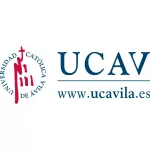ABOUT
US
WHO WE ARE
The Catholic University of Avila (UCAV) is an educational institution, with more than 7,000 students, located in the historic city of Avila (Spain), declared a World Heritage Site by UNESCO. The UCAV has four faculties: Sciences and Arts, Social Sciences, Humanities and Education and Health Sciences.
The Faculty of Social Sciences and Law has professors, researchers and technical staff dedicated to the study of Cultural Heritage. Some of its members are part of the research group "Territory, History and Cultural Heritage-Digital" -TEHIPAD-, with experience in the study and enhancement of Heritage in rural centers in the province of Avila, through the analysis of their economic systems, main artistic assets, and the guarantees of legal protection.
The UCAV is a member of the International Federation of Catholic Universities (FIUC); the Council of Spanish Universities (CRUE); the International Council of Universities of St. Thomas Aquinas (ICUSTA); UNIVERSIA, and the Conference of Rectors of Universities of Southwest Europe (CRUSOE).
The Diocese of Avila participates in the project through its Archive. The Diocesan Archive of Avila (ADA) carries out its activity at the service of the community, as an organization dedicated to the conservation, protection, and dissemination of the historical documentation of all the villages in the province of Avila. The current Archive building houses more than 5,000 boxes of documents from the 15th century to the present day, belonging to 350 rural centers. Thanks to these records it is possible to learn about Cultural Heritage and centuries-old traditions to prevent them from disappearing. The workers of the Diocesan Archive are specialists in History, Cultural Heritage, and computer engineering. In addition to assisting researchers, their professional work consists of digitizing, cataloguing, and studying documentary collections.
The Diocese of Avila will participate in the project through its Archive. The Diocesan Archive of Avila (ADA) carries out its activity at the service of the community, as an organization dedicated to the conservation, protection, and dissemination of the historical documentation of all the towns in the province of Avila. The current Archive building houses more than 5,000 boxes of documents from the 15th century to the present day, belonging to 350 rural centers. Thanks to these records it is possible to learn about the Cultural Heritage and centuries-old traditions to prevent them from disappearing. The workers of the Diocesan Archives are specialists in History, Cultural Heritage, and computer engineering. In addition to assisting researchers, their professional work consists of digitizing, cataloging, and studying documentary collections.
The Institute for Ethnology and Folklore Studies with Ethnographic Museum (IEFEM-BAS) is the national center for ethnological, folklore, museum and cultural anthropological research in Bulgaria. IEFEM-BAS has rich libraries and archives (with audio, photo, and video field recordings; diaries and descriptions, etc.). The National Ethnographic Museum has several collections of artefacts related to domestic objects; agriculture and animal husbandry; carpets; wood carvings; iron tools; copper work; jewelry; festive and ritual attributes; traditional folk clothing; embroidery, small textiles, and fine arts.
The Museum is in Sofia, in the building of the former Royal Palace, now shared with the National Art Gallery. The museum does not have a permanent exhibition.
At present, IEFEM-BAS has a staff of about 118 specialists, competent in many different areas of ethnology; folklore studies; and in many different areas of museum activities: conservation, restoration, museum management and education.
Basilicata Culture (CBC) is a non-profit association that works to carry out projects and interventions in the Lucanian area by promoting the culture of the landscape, solidarity, and social responsibility, for a better quality of life.
It aims to represent and aggregate the entire local community as much as possible - cultures, economic and social categories, experiences - and to satisfy the needs and requirements of the territory for the development of the community, in total autonomy and independence.
Basilicata Culture is a non-profit association that works in the region of Potenza, Italy, to carry out projects and interventions in the territory of Basilicata promoting cultural heritage in all its dimensions, and the culture of solidarity and social responsibility for a better quality of life.
Its aim is to represent the local community - cultures, economic and social categories, experiences - and to satisfy the needs and requirements of the territory in total autonomy and independence.
The University of Basilicata (UNIBAS) is a higher education institution with about 6,000 students, divided into four departments and two schools. The University has three campuses, two in Potenza (regional capital of Basilicata and seat of the university) and one in Matera (provincial capital). Matera was declared a UNESCO World Heritage Site and designated European City of Culture for 2019.
The research areas of the humanities departments are particularly oriented towards the study, promotion, and protection of the tangible and intangible cultural heritage of Basilicata and of the territories of southern Italy and the Mediterranean. The University's internal research programmes respond to the rural vocation of Basilicata; several projects deal with history, culture and traditions studied from a historical, artistic, anthropological, social, and cultural perspective.
Founded in 1915, Warsaw University of Technology (WUT) is a technical research university with an educational tradition dating back to the 19th century. It is a forward-looking institution where high quality is combined with world-class research and innovation. WUT ranks first among technical universities in Poland. WUT offers education at all levels: bachelor's, master’s, and doctoral degrees in 19 faculties and one college.
WUT's acclaimed reputation is demonstrated by about 100 international academic and research cooperations; active agreements with universities, research centers and high-tech industries from about 30 countries all over the world.
Founded in 1915, Warsaw University of Technology is a technical research university with an educational tradition dating back to the 19th century. It is a forward-looking institution where high quality is combined with world-class research and innovation. WUT ranks first among technical universities in Poland. WUT offers education at all levels: bachelor's, master’s, and doctoral degrees in 19 faculties and one graduate school.
WUT's acclaimed reputation is demonstrated by about 100 international academic and research cooperations; active agreements with universities, research centers and high-tech industries from about 30 countries all over the world.















